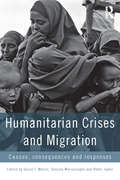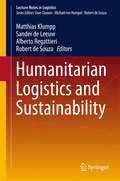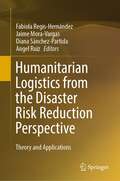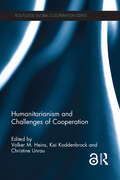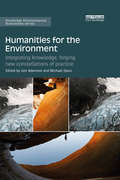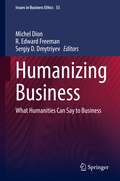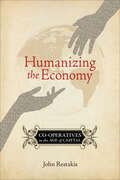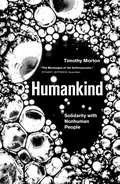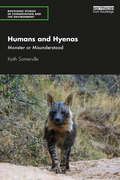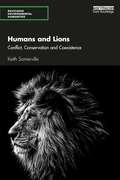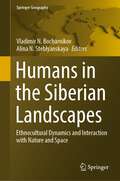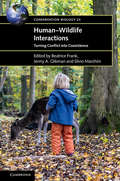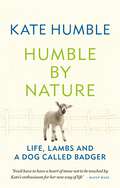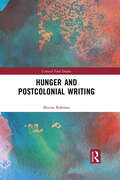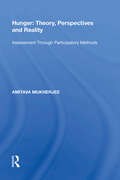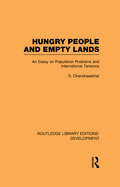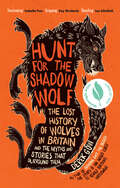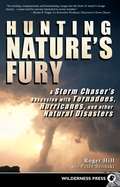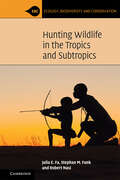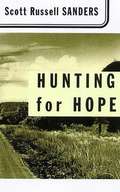- Table View
- List View
Humanitarian Crises and Migration: Causes, Consequences and Responses
by Susan F. Martin, Sanjula Weerasinghe and Abbie TaylorWhether it is the stranding of tens of thousands of migrant workers at the Libyan–Tunisian border, or the large-scale displacement triggered by floods in Pakistan and Colombia, hardly a week goes by in which humanitarian crises have not precipitated human movement. While some people move internally, others internationally, some temporarily and others permanently, there are also those who become "trapped" in place, unable to move to greater safety. Responses to these "crisis migrations" are varied and inadequate. Only a fraction of "crisis migrants" are protected by existing international, regional or national law. Even where law exists, practice does not necessarily guarantee safety and security for those who are forced to move or remain trapped. Improvements are desperately needed to ensure more consistent and effective responses. This timely book brings together leading experts from multi-disciplinary backgrounds to reflect on diverse humanitarian crises and to shed light on a series of exploratory questions: In what ways do people move in the face of crisis situations? Why do some people move, while others do not? Where do people move? When do people move, and for how long? What are the challenges and opportunities in providing protection to crisis migrants? How might we formulate appropriate responses and sustainable solutions, and upon what factors should these depend? This volume is divided into four parts, with an introductory section outlining the parameters of "crisis migration," conceptualizing the term and evaluating its utility. This section also explores the legal, policy and institutional architecture upon which current responses are based. Part II presents a diverse set of case studies, from the earthquake in Haiti and the widespread violence in Mexico, to the ongoing exodus from Somalia, and environmental degradation in Alaska and the Carteret Islands, among others. Part III focuses on populations that may be at particular risk, including non-citizens, migrants at sea, those displaced to urban areas, and trapped populations. The concluding section maps the global governance of crisis migration and highlights gaps in current provisions for crisis-related movement across multiple levels. This valuable book brings together previously diffuse research and policy issues under the analytical umbrella of "crisis migration." It lays the foundations for assessing and addressing real challenges to the status quo, and will be of interest to scholars, policy makers, and practitioners committed to seeking out improved responses and ensuring the dignity and safety of millions who move in the context of humanitarian crises.
Humanitarian Logistics and Sustainability
by Matthias Klumpp Sander Leeuw Alberto Regattieri Robert SouzaThis contributed volume combines conceptual and strategic research articles dealing with the "why" and "to what end" of sustainable operations in humanitarian logistics, as well as operational research contributions regarding the "how" from the United Nations as well as from researchers and organizations from different countries (Germany, Australia, Singapore, Netherlands, Italy, Denmark, Jordan). The target audience primarily comprises research experts, decision makers and practitioners in the field, but the book may also be beneficial for graduate students.
Humanitarian Logistics from the Disaster Risk Reduction Perspective: Theory and Applications
by Angel Ruiz Diana Sánchez-Partida Fabiola Regis-Hernández Jaime Mora-VargasThis book aims to clarify the priorities of the Sendai Framework for the DRR 2015 – 2030, through gathering recent contributions addressing the different ways researchers define, measure, reduce, and manage risk in the challenge of the DRR. Beyond a discussion of the different definitions of disaster risk; this book provides contributions focused on optimization approaches that support the decision-making process in the challenge of managing DRR problems considering emerging disaster risks in the medium and long term, as well as national and local applications. Some of the topics covered include network flow problems, stochastic optimization, discrete optimization, multi-objective programming, approximation techniques, and heuristic approaches.The target audience of the book includes professionals who work in Linear Programming, Logistics, Optimization (Mathematical, Robust, Stochastic), Management Science, Mathematical Programming, Networks, Scheduling, Simulation, Supply Chain Management, Sustainability, and similar areas. It can be useful for researchers, academics, graduate students, and anyone else doing research in the field
Humanitarianism and Challenges of Cooperation (Routledge Global Cooperation Series)
by Volker M. Heins Kai Koddenbrock Christine UnrauHumanitarianism as a moral concept and an organized practice has become a major factor in world society. It channels an enormous amount of resources and serves as an argument for different kinds of interference into the "internal affairs" of countries and regions. At the same time, and for these very reasons, it is an ideal testing ground for successful and unsuccessful cooperation across borders. Humanitarianism and the Challenges of Cooperation examines the multiple humanitarianisms of today as a testing ground for new ways of global cooperation. General trends in the contemporary transformation of humanitarianism are studied and individual cases of how humanitarian actors cooperate with others on the ground are investigated. This book offers a highly innovative, empirically informed account of global humanitarianism from the point of view of cooperation research in which internationally renowned contributors analyse broad trends and present case studies based on meticulous fieldwork. This book will be of great interest to students and researchers in the areas of political science, international relations and humanitarianism. It is also a valuable resource for humanitarian aid workers.
Humanitarianism and Challenges of Cooperation (Routledge Global Cooperation Series)
by Volker M. Heins Kai Koddenbrock Christine UnrauHumanitarianism as a moral concept and an organized practice has become a major factor in world society. It channels an enormous amount of resources and serves as an argument for different kinds of interference into the "internal affairs" of countries and regions. At the same time, and for these very reasons, it is an ideal testing ground for successful and unsuccessful cooperation across borders.Humanitarianism and the Challenges of Cooperation examines the multiple humanitarianisms of today as a testing ground for new ways of global cooperation. General trends in the contemporary transformation of humanitarianism are studied and individual cases of how humanitarian actors cooperate with others on the ground are investigated. This book offers a highly innovative, empirically informed account of global humanitarianism from the point of view of cooperation research in which internationally renowned contributors analyse broad trends and present case studies based on meticulous fieldwork. This book will be of great interest to students and researchers in the areas of political science, international relations and humanitarianism. It is also a valuable resource for humanitarian aid workers.
Humanities for the Environment: Integrating knowledge, forging new constellations of practice (Routledge Environmental Humanities)
by Michael Davis Joni AdamsonHumanities for the Environment, or HfE, is an ambitious project that from 2013-2015 was funded by a generous grant from the Andrew W. Mellon Foundation. The project networked universities and researchers internationally through a system of 'observatories'. This book collects the work of contributors networked through the North American, Asia-Pacific, and Australia-Pacific observatories. Humanities for the Environment showcases how humanists are working to 'integrate knowledges' from diverse cultures and ontologies and pilot new 'constellations of practice' that are moving beyond traditional contemplative or reflective outcomes (the book, the essay) towards solutions to the greatest social and environmental challenges of our time. With the still controversial concept of the 'Anthropocene' as a starting point for a widening conversation, contributors range across geographies, ecosystems, climates and weather regimes; moving from icy, melting Arctic landscapes to the bleaching Australian Great Barrier Reef, and from an urban pedagogical 'laboratory' in Phoenix, Arizona to Vatican City in Rome. Chapters explore the ways in which humanists, in collaboration with communities and disciplines across academia, are responding to warming oceans, disappearing islands, collapsing fisheries, evaporating reservoirs of water, exploding bushfires, and spreading radioactive contamination. This interdisciplinary work will be of great interest to scholars in the humanities, social sciences, and sciences interested in interdisciplinary questions of environment and culture.
Humanizing Business: What Humanities Can Say to Business (Issues in Business Ethics #53)
by R. Edward Freeman Michel Dion Sergiy D. DmytriyevThis book is about humanizing business. In contrast to the mainstream modern management and leadership literature, this book provides distinctly humane perspectives on business. The volume travels outside the world of business to explore what Humanities – such as Philosophy, History, Literature, Creative Arts, and Cultural Studies – can offer to business. Renowned scholars from different Humanities disciplines, as well as management researchers exploring the heritage of Humanities, convey what it actually means to make business more humane. The book strives to humanize business. It aims to show that it is not people who have to suppress their human feelings, aspirations, and beliefs when they are at their workplaces, but it is business itself that needs to be redefined by the human norms of human beings. Companies should care about their employees and other stakeholders letting them be themselves, i.e. be human, at work and beyond. The book will be of interest to management scholars across various business disciplines. It can also be used as teaching material in the classroom with MBA students, especially in Business Ethics, Business and Society, Sustainability, Organizational Behavior, Human Resource Management and other management courses. The volume will also be of interest to scholars that work in different Humanities fields and whose interests span organizations, management, and business. Finally, many practitioners in the business world, especially those in managerial and leadership positions, will find the book both thought-provoking and useful for them as well.Chapter 37 is available open access under a Creative Commons Attribution 4.0 International License via link.springer.com.
Humanizing the Economy: Co-operatives in the Age of Capital
by John RestakisHow the largest social movement in history is making the world a better place.At the close of the twentieth century, corporate capitalism extended its reach over the globe. While its defenders argue that globalization is the only way forward for modern, democratic societies, the spread of this system is failing to meet even the most basic needs of billions of individuals around the world. Moreover, the entrenchment of this free market system is undermining the foundations of healthy societies, caring communities, and personal wellbeing.Humanizing the Economy shows how co-operative models for economic and social development can create a more equitable, just, and humane future. With over 800 million members in 85 countries and a long history linking economic to social values, the co-operative movement is the most powerful grassroots movement in the world. Its future as an alternative to corporate capitalism is explored through a wide range of real-world examples including:Emilia Romagna's co-operative economy of in Northern ItalyArgentina's recovered factory movementJapan's consumer and health co-operativesHighlighting the hopes and struggles of everyday people seeking to make their world a better place, Humanizing the Economy is essential reading for anyone who cares about the reform of economics, globalization, and social justice.John Restakis has been active in the co-op movement for 15 years. He is the Executive Director of the BC Co-operative Association and has been a consultant for co-op development projects in Africa and Asia. A pioneering researcher on co-operative economies, he writes and lectures on economic democracy and the role of co-operatives in humanizing economies.
Humankind: Solidarity with Non-Human People
by Timothy MortonA radical call for solidarity between humans and non-humansWhat is it that makes humans human? As science and technology challenge the boundaries between life and non-life, between organic and inorganic, this ancient question is more timely than ever. Acclaimed Object-Oriented philosopher Timothy Morton invites us to consider this philosophical issue as eminently political. It is in our relationship with non-humans that we decided the fate of our humanity. Becoming human, claims Morton, actually means creating a network of kindness and solidarity with non-human beings, in the name of a broader understanding of reality that both includes and overcomes the notion of species. Negotiating the politics of humanity is the first and crucial step to reclaim the upper scales of ecological coexistence, not to let Monsanto and cryogenically suspended billionaires to define them and own them.From the Trade Paperback edition.
Humans and Hyenas: Monster or Misunderstood (Routledge Studies in Conservation and the Environment)
by Keith SomervilleHumans and Hyenas examines the origins and development of the relationship between the two to present an accurate and realistic picture of the hyena and its interactions with people. The hyena is one of the most maligned, misrepresented and defamed mammals. It is still, despite decades of research-led knowledge, seen as a skulking, cowardly scavenger rather than a successful hunter with complex family and communal systems. Hyenas are portrayed as sex-shifting deviants, grave robbers and attackers of children in everything from African folk tales through Greek and Roman accounts of animal life, to Disney’s The Lion King depicting hyenas with a lack of respect and disgust, despite the reality of their behaviour and social structures. Combining the personal, in-depth mining of scientific papers about the three main species and historical accounts, Keith Somerville delves into our relationship with hyenas from the earliest records from millennia ago, through the accounts by colonisers, to contemporary coexistence, where hyenas and humans are forced into ever closer proximity due to shrinking habitats and loss of prey. Are hyenas fated to retain their bad image or can their amazing ability to adapt to humans more successfully than lions and other predators lead to a shift in perspective? This book will be of great interest to students and scholars in the environmental sciences, conservation biology, and wildlife and conservation issues.
Humans and Lions: Conflict, Conservation and Coexistence (Routledge Environmental Humanities)
by Keith SomervilleThis book places lion conservation and the relationship between people and lions both in historical context and in the context of the contemporary politics of conservation in Africa. The killing of Cecil the Lion in July 2015 brought such issues to the public’s attention. Were lions threatened in the wild and what was the best form of conservation? How best can lions be saved from extinction in the wild in Africa amid rural poverty, precarious livelihoods for local communities and an expanding human population? This book traces man’s relationship with lions through history, from hominids, to the Romans, through colonial occupation and independence, to the present day. It concludes with an examination of the current crisis of conservation and the conflict between Western animal welfare concepts and sustainable development, thrown into sharp focus by the killing of Cecil the lion. Through this historical account, Keith Somerville provides a coherent, evidence-based assessment of current human-lion relations, providing context to the present situation. This book will be of interest to students and scholars of environmental and African history, wildlife conservation, environmental management and political ecology, as well as the general reader.
Humans in the Siberian Landscapes: Ethnocultural Dynamics and Interaction with Nature and Space (Springer Geography)
by Vladimir N. Bocharnikov Alina N. SteblyanskayaThis book considers theoretical issues of the ethnocultural landscape concepts at large as well as examples of its practical application in ethnic communities of Siberia. It reveals the patterns of the processes of penetration, settlement, development and adaptation of Siberian populations from Paleolithic time to Russian colonization in the era of the Russian Empire, during Soviet modernization and in the face of modern challenges. The authors consider the principal interactions (character, stages, conditions), system-related evidence and phenomena that determine the diverse specifics and multidirectional vectors of a change in the ethnic (social, cultural, economic, legal) presence in large subregions of Siberia in the mirror of various theoretical paradigms. This transdisciplinary volume appeals to researchers, lecturers and students in the fields of geography, history, philosophy, anthropology, ecology, archaeology and interfaces to many other disciplines.
Human–Wildlife Interactions: Turning Conflict into Coexistence (Conservation Biology #23)
by Beatrice Frank Jenny A. Glikman Silvio MarchiniHuman-wildlife conflict (HWC) is one of the most complex and urgent issues facing wildlife management and conservation today. Originally focused on the ecology and economics of wildlife damage, the study and mitigation of HWC has gradually expanded its scope to incorporate the human dimensions of the whole spectrum of human-wildlife relationships, from conflict to coexistence. Having the conflict-to-coexistence continuum as its leitmotiv, this book explores a variety of theories and methods currently used to address human-wildlife interactions, illustrated by case studies from around the world. It presents some key concepts in the field, such as values, emotions, social identity and tolerance, and a variety of insights and solutions to turn conflict into coexistence, from individual level to national scales, including conservation marketing, incremental and radical innovation, strategic planning, and socio-ecological systems. This volume will be of interest to a wide range of readers, including academics, researchers, students, practitioners and policy-makers.
Humble by Nature: Life, lambs and a dog called Badger
by Kate Humble'You'd have to have a heart of stone not to be touched by Kate's enthusiasm for her new way of life' - Daily MailIn 2007, after 20 years of living in London, Kate Humble and her husband Ludo decided it was time to leave city life behind them. Three years later, now the owner of a Welsh smallholding, Kate hears that a nearby farm is to be broken up and sold off. Another farm lost; another opportunity for a young farmless farmer gone. Desperate to stop the sale, Kate contacts the council with an alternative plan - to keep the farm working and to run a rural skills and animal husbandry school alongside it. Against all odds, she succeeds.Here, in Humble by Nature, Kate shares with us a highly personal account of her journey from London town house to Welsh farm. Along the way we meet Bertie and Lawrence the donkeys, Myfanwy and Blackberry the pigs and goats Biscuit and Honey, not forgetting a dog called Badger and his unladylike sidekick Bella. And we are introduced to the tenant farmers Tim and Sarah, the locals who helped and some who didn't, and a whole host of newborn lambs.Full of the warmth and passion for the natural world that makes Kate such a sought after presenter, Humble By Nature is the story of two people prepared to follow their hearts and save a small part of Britain's farming heritage, whatever the consequences.
Humble by Nature: Life, lambs and a dog called Badger (Kate Humble)
by Kate Humble'You'd have to have a heart of stone not to be touched by Kate's enthusiasm for her new way of life' - Daily MailIn 2007, after 20 years of living in London, Kate Humble and her husband Ludo decided it was time to leave city life behind them. Three years later, now the owner of a Welsh smallholding, Kate hears that a nearby farm is to be broken up and sold off. Another farm lost; another opportunity for a young farmless farmer gone. Desperate to stop the sale, Kate contacts the council with an alternative plan - to keep the farm working and to run a rural skills and animal husbandry school alongside it. Against all odds, she succeeds.Here, in Humble by Nature, Kate shares with us a highly personal account of her journey from London town house to Welsh farm. Along the way we meet Bertie and Lawrence the donkeys, Myfanwy and Blackberry the pigs and goats Biscuit and Honey, not forgetting a dog called Badger and his unladylike sidekick Bella. And we are introduced to the tenant farmers Tim and Sarah, the locals who helped and some who didn't, and a whole host of newborn lambs.Full of the warmth and passion for the natural world that makes Kate such a sought after presenter, Humble By Nature is the story of two people prepared to follow their hearts and save a small part of Britain's farming heritage, whatever the consequences.
Humble by Nature: Life, lambs and a dog called Badger (Kate Humble)
by Kate Humble'You'd have to have a heart of stone not to be touched by Kate's enthusiasm for her new way of life' - Daily MailIn 2007, after 20 years of living in London, Kate Humble and her husband Ludo decided it was time to leave city life behind them. Three years later, now the owner of a Welsh smallholding, Kate hears that a nearby farm is to be broken up and sold off. Another farm lost; another opportunity for a young farmless farmer gone. Desperate to stop the sale, Kate contacts the council with an alternative plan - to keep the farm working and to run a rural skills and animal husbandry school alongside it. Against all odds, she succeeds.Here, in Humble by Nature, Kate shares with us a highly personal account of her journey from London town house to Welsh farm. Along the way we meet Bertie and Lawrence the donkeys, Myfanwy and Blackberry the pigs and goats Biscuit and Honey, not forgetting a dog called Badger and his unladylike sidekick Bella. And we are introduced to the tenant farmers Tim and Sarah, the locals who helped and some who didn't, and a whole host of newborn lambs.Full of the warmth and passion for the natural world that makes Kate such a sought after presenter, Humble By Nature is the story of two people prepared to follow their hearts and save a small part of Britain's farming heritage, whatever the consequences.
Hungary: Economic Policies for Sustainable Growth
by International Monetary FundA report from the International Monetary Fund.
Hunger and Postcolonial Writing (Critical Food Studies)
by Muzna RahmanHunger and Postcolonial Writing explores contemporary postcolonial fiction and life-writing from various geo-political contexts. The focus of this work is hunger; individuated in the self-imposed starvation of the hunger protester, and on a mass scale in the form of famine and food insecurity. It considers the hungry colonial and postcolonial body, examines its textual forms and historical trajectories, and situates it within the food security context of imperialism and its legacies. This book is the first monograph-length study of hunger within a postcolonial/world literary context. Its transcolonial focus produces comparative readings across postcolonial writings, facilitating productive analyses of the operations of imperialism and its aftereffects across heterogenous zones of colonialism. This project reads hunger as defined by the social, cultural, historical, and economic engagements produced by colonial and postcolonial encounters. Examining the starving colonialized body through Cartesian models of somatic subjectivity, and considering how this body is mediated by post-Enlightenment discourses of Modernity and progress, this work interrogates the contradictions produced by the starving colonial body as it is positioned between the possibility of radical protest and prescriptive colonial discourse. This book will be of interest to Gastrocritical and Postcolonial scholars and students, and to Food scholars more broadly.
Hunger: Assessment Through Participatory Methods (King's Soas Studies In Development Geography)
by Amitava MukherjeeHunger is an issue which has been subject to much rigorous intellectual examination by economists, philosophers, sociologists, NGOs and governments. This volume provides a critical overview of current academic and political perspectives and then compares these views from thenon-hungry people with those of thehungry particularly from a broad range of poor communities in India. Their views are gathered using participatory rural appraisal techniques and the scale of the material presented is unprecedented. Not surprisingly, the comparisons show that the perceptions of the hungry are fundamentally different from those of the non-hungry. It makes compelling suggestions about how best policy makers can attempt to eliminate hunger based on what the hungry themselves suggest. The book also draws attention to the critical role of Common Property Resources and women in the fight against under-nutrition, which have so far been largely ignored.
Hungry People and Empty Lands: An Essay on Population Problems and International Tensions (Routledge Library Editions: Development)
by S. ChandrasekharFirst published in 1954, this reissue deals with the problem of international tensions arising from demographic and fertility differences, with special reference to such heavily populated Asian countries as China, Japan and India.
Hunt for the Shadow Wolf [US Edition]: The lost history of wolves in Britain and the myths and stories that surround them
by Derek Gow"Terrific, life-lit moments come howling out of Hunt for the Shadow Wolf."—The Telegraph "[Derek Gow is] a wry, profane truth teller who is equal parts yeoman farmer, historical ecologist, and pirate."—Ben Goldfarb, author of Eager and Crossings "Beautifully crafted, fascinating and unbearably poignant, I totally loved this book."—Isabella Tree, author of Wilding Renowned rewilder Derek Gow has a dream: that one day we will see the return of the wolf to Britain as it has already returned elsewhere. As Derek worked to reintroduce the beaver, he began to hear stories of the wolf, both real and mythical, and his fascination with this creature grew. With increasing curiosity, Derek started to piece together fragments of information, stories and artefacts to reveal a shadowy creature that first walked proud through these lands and then was hunted to extinction as coexistence turned to fear, hatred – and domination. What Derek came to realize was that the underlying motives behind our hatred were actually far more prosaic and, like most persecutions, to do with power and profit. We turned the wolf into a savage beast and saw its extirpation as a civilizing mission. But the wolf survived far longer than many thought and Derek tells of his sightings of the wolf through folklore and mythology, the records of grand estates and parish churches as well as wolf heads, both real and recreated. With bitingly funny but also tender stories, Hunt for the Shadow Wolf is Derek’s quest to uncover the true nature of this creature because, as we seek to heal our landscape, we must reconcile our relationship with it. Before we can even begin to bring the wolf back, we need to understand it. "I have loved this chase dearly and though what unfolds might be an ending of sorts, I have no intention to let this hunt cease."―Derek Gow, from Hunt for the Shadow Wolf "Gow reinvents what it means to be a guardian of the countryside."—The Guardian
Hunt for the Shadow Wolf [US Edition]: The lost history of wolves in Britain and the myths and stories that surround them
by Derek GowLonglisted for the James Cropper Wainwright Prize 2024 for Nature Writing"Terrific, life-lit moments come howling out of Hunt for the Shadow Wolf."—The Telegraph"One of the most remarkable figures in British conservation."—The Observer"There have been several books on the fate of British wolves, but this is the best."—The Spectator"[Derek Gow is] a wry, profane truth teller who is equal parts yeoman farmer, historical ecologist, and pirate."—Ben Goldfarb, author of Eager and CrossingsRenowned rewilder Derek Gow has a dream: that one day we will see the return of the wolf to Britain as it has already returned elsewhere. As Derek worked to reintroduce the beaver, he began to hear stories of the wolf, both real and mythical, and his fascination with this creature grew. With increasing curiosity, Derek started to piece together fragments of information, stories and artefacts to reveal a shadowy creature that first walked proud through these lands and then was hunted to extinction as coexistence turned to fear, hatred – and domination.What Derek came to realize was that the underlying motives behind our hatred were actually far more prosaic and, like most persecutions, to do with power and profit. We turned the wolf into a savage beast and saw its extirpation as a civilizing mission. But the wolf survived far longer than many thought and Derek tells of his sightings of the wolf through folklore and mythology, the records of grand estates and parish churches as well as wolf heads, both real and recreated.With bitingly funny but also tender stories, Hunt for the Shadow Wolf is Derek&’s quest to uncover the true nature of this creature because, as we seek to heal our landscape, we must reconcile our relationship with it. Before we can even begin to bring the wolf back, we need to understand it."I have loved this chase dearly and though what unfolds might be an ending of sorts, I have no intention to let this hunt cease."―Derek Gow, from Hunt for the Shadow Wolf"Beautifully crafted, fascinating and unbearably poignant, I totally loved this book."—Isabella Tree, author of Wilding"Gow reinvents what it means to be a guardian of the countryside."—The Guardian
Hunting Nature's Fury
by Peter Bronski Roger HillEach year, at least 1,200 tornadoes batter the United States. While most occur in Tornado Alley-a vast, weather-beaten swath of middle America-in truth, tornadoes can occur almost anywhere. And where there are tornadoes, there are storm chasers. They come in all shapes and sizes, from hobbyists to researchers to professional chasers. There is one, however, who stands well above the rest: Roger Hill.Hunting Nature's Fury tells the story of Roger Hill and his love affair with storm chasing, taking you on a suspenseful and dramatic ride across the Great Plains, into the Deep South, even into the eyes of such recent hurricanes as Katrina. You'll accompany Hill as he braves close calls, makes history, and gains insight into the science of severe weather. This is a story of a storm chaser obsessed with the storms that almost killed him; of resiliency in the face of disaster; and of humility in the presence of the awesome power of nature.Includes eight color pages of jaw-dropping photos taken by Hill showing many of the storms chronicled in the book.
Hunting Wildlife in the Tropics and Subtropics (Ecology, Biodiversity and Conservation)
by Stephan M. Funk Julia E. Fa Robert NasiThe hunting of wild animals for their meat has been a crucial activity in the evolution of humans. It continues to be an essential source of food and a generator of income for millions of Indigenous and rural communities worldwide. Conservationists rightly fear that excessive hunting of many animal species will cause their demise, as has already happened throughout the Anthropocene. Many species of large mammals and birds have been decimated or annihilated due to overhunting by humans. If such pressures continue, many other species will meet the same fate. Equally, if the use of wildlife resources is to continue by those who depend on it, sustainable practices must be implemented. These communities need to remain or become custodians of the wildlife resources within their lands, for their own well-being as well as for biodiversity in general. This title is also available via Open Access on Cambridge Core.
Hunting for Hope: A Father's Journeys
by Scott Russell SandersIn a narrative threaded with the moving story of his father-son trip, Sanders sets out to accumulate his own reasons for hope. These richly examined medicine bundles of hope, Scott Russell Sanders brings all of his considerable powers as an elegant writer of prose.
